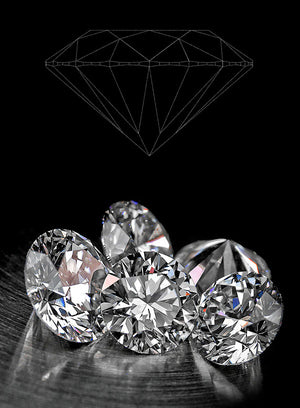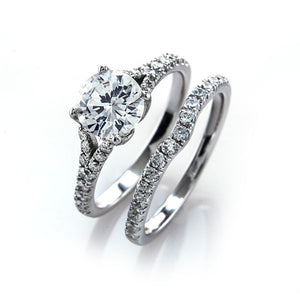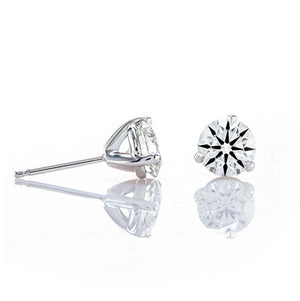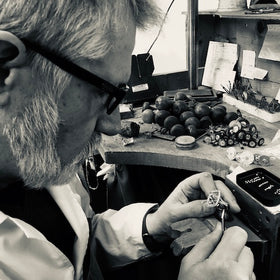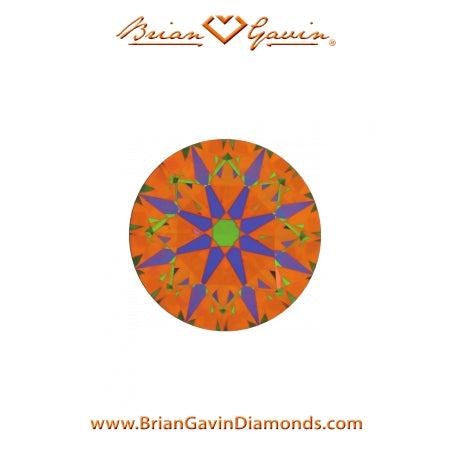
Buyers Guide: ASET images of near hearts and arrows diamonds
“I’ve been contemplating buying this 1.823 carat, I-color, VS-1 clarity, Brian Gavin Signature round hearts and arrows diamond. Everybody I’ve checked with online, tells me that it’s a beautiful diamond that is going to sparkle like crazy! But I’ve got to be honest and say that I found another 1.80 carat, I-color, VS-1 clarity, GIA Excellent cut round diamond that is almost hearts and arrows which looks pretty good to me and costs less. Would it be completely wrong of me to ask you to look over the ASET image for this near hearts and arrows diamond and tell me whether the light performance is going to be comparable? I don’t really know what I’m looking at, but I know that you can help me make an informed decision.”
 Why Brian says “It’s all in the hearts”:
Why Brian says “It’s all in the hearts”:
Forgive me for being blunt, but I think you’ll appreciate a more direct approach. The fact of the matter is that in the world of diamond cutting, there is no such thing as near hearts and arrows; the diamond simply exhibits a crisp and complete pattern of hearts and arrows or it does not. The hearts and arrows pattern pictured by this Brian Gavin Signature round diamond is proof positive that the diamond has been cut to exhibit the highest degree of optical precision. The sparkle factor of the diamond is guaranteed; and as you can see, both the ASET Scope and H&A Scope images are pristine. The diamond will exhibit the highest light performance possible.
GIA Excellent does not mean Hearts and Arrows:
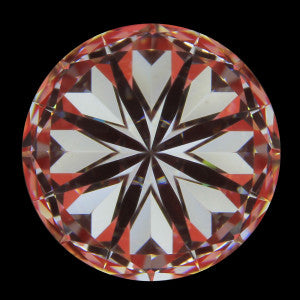 The pattern of lawn darts exhibited by the 1.80 carat, I-color, VS-2 clarity, GIA Excellent cut round diamond that you sent us a link to, is just that… a pattern of lawn darts. Now we’re perfectly aware that some people think that this degree of optical precision is good enough, the diamond does exhibit some sort of pattern when viewed through an H&A scope after all. But do you see how erratic the pattern actually is? Do you see how the lawn darts vary in size and shape? How the tips of the lawn darts are twisting? Those are all indications that there is a variance in the length of the lower girdle facets. The diamond lacks the 360° precision that we’re known for.
The pattern of lawn darts exhibited by the 1.80 carat, I-color, VS-2 clarity, GIA Excellent cut round diamond that you sent us a link to, is just that… a pattern of lawn darts. Now we’re perfectly aware that some people think that this degree of optical precision is good enough, the diamond does exhibit some sort of pattern when viewed through an H&A scope after all. But do you see how erratic the pattern actually is? Do you see how the lawn darts vary in size and shape? How the tips of the lawn darts are twisting? Those are all indications that there is a variance in the length of the lower girdle facets. The diamond lacks the 360° precision that we’re known for.
Now this sort of thing can be confusing, because the diamond has an overall cut grade of GIA Excellent and the proportions are within the center range designated for the AGS Ideal cut proportions rating. Most people are likely to assume that the 40.8 degree pavilion angle will produce a high volume of light return, and that the 35.0 degree crown angle will produce a virtual balance of brilliance and dispersion.
 But let me ask you a question. What do you think all of that translucent white space is under the table facet of this diamond? And why do you think that the arrows pattern visible in the ASET image for this “near hearts and arrows diamond” are not exhibiting the high degree of contrast exhibited by the Brian Gavin Signature diamond pictured above? Both diamonds were photographed on a white background, so that’s not it… The BGD Signature round is exhibiting bright, vibrant reds and bold greens, with exceptional contrast brilliance. It seems to me that this diamond is practically fading out in the ASET Scope image.
But let me ask you a question. What do you think all of that translucent white space is under the table facet of this diamond? And why do you think that the arrows pattern visible in the ASET image for this “near hearts and arrows diamond” are not exhibiting the high degree of contrast exhibited by the Brian Gavin Signature diamond pictured above? Both diamonds were photographed on a white background, so that’s not it… The BGD Signature round is exhibiting bright, vibrant reds and bold greens, with exceptional contrast brilliance. It seems to me that this diamond is practically fading out in the ASET Scope image.
Why do arrows of a diamond look black?
 If you look at the clarity photograph provided for this 1.823 carat, I-color, VS-1 clarity, Brian Gavin Signature round diamond on the diamond details page, you’ll notice that the arrows pattern is reflecting the black color of the camera lens. But the arrows pattern exhibited by this other 1.80 carat, GIA Excellent cut round diamond are translucent and washed out. This is because they’re not picking up and reflecting the camera lens back at you. This diamond is not exhibiting what we consider to be optimum contrast brilliance. You can see the light leaking around the edge of the table facet. These two diamonds are simply not comparable.
If you look at the clarity photograph provided for this 1.823 carat, I-color, VS-1 clarity, Brian Gavin Signature round diamond on the diamond details page, you’ll notice that the arrows pattern is reflecting the black color of the camera lens. But the arrows pattern exhibited by this other 1.80 carat, GIA Excellent cut round diamond are translucent and washed out. This is because they’re not picking up and reflecting the camera lens back at you. This diamond is not exhibiting what we consider to be optimum contrast brilliance. You can see the light leaking around the edge of the table facet. These two diamonds are simply not comparable.
I won’t assume to tell you which diamond you should buy now, but it seems to me that the images provided for this 1.823 carat, I-color, VS-1 clarity, Brian Gavin Signature round hearts and arrows diamond paint a pretty clear picture as to which diamond offers the best light performance. The thing is that only you can decide which level of visual performance and precision best suits your needs and expectations of sparkle.





